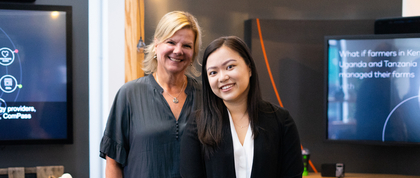
Pictured (left to right): Renee Ratay, Director of the Humanitarian and Development Team at MasterCard; and Cynthia Wang, NYU GPH undergraduate student.
A Student Highlight of Undergraduate Student, Cynthia Wang
In the depths of their academic pursuits, students often contemplate the why. Why are we required to study X or research Y? It isn’t always clear what value their hard work will yield.
While the phrase “improving lives for a living,” is often used to describe the field of public health, for NYU student Cynthia Wang, it took the serendipity of landing a coveted internship with MasterCard’s Humanitarian and Development team for the puzzle to fall into place.
Inspired by famed “father of psychoanalysis” and neurologist, Dr. Sigmund Freud, Cynthia had often contemplated “What determines someone’s success? What resources are available and how can they best be maximized to support the community?”
To answer these questions, she followed her dual passions for applied psychology and public health studies at NYU. Cynthia grounded herself in understanding the influence of education policy, growing into adolescence, and familial interactions on daily life and development. She worked alongside Dr. Catherine Tamis-LeMonda at NYU Steinhardt’s Center of Research for Culture, Development and Education, studying the influence of parent-child relationships on childhood language & motor development. Yet, she still felt that that a critical piece of the picture was missing. She couldn’t help but wonder: “The research and results we found were interesting but to what end? How can this data actually result in changing even a single life?"
It wasn’t until Cynthia started working with Renee Ratay, a Director in the Humanitarian and Development team at MasterCard, that she fully grasped just how many lives can be improved or saved as a result of the concerted efforts of others.
To many, MasterCard may be best known as a global payments technology company, but the company has also established a respected position at the crossroads of private and public sector program development and implementation.
Cynthia was selected for an internship in the Solutions Engineering group within their Humanitarian Development team. She worked with and learned from technologists and entrepreneurs on the newest MasterCard/Gavi pilot program, the Wellness Pass. This pilot aims to improve the efficiency and reach of immunization in Mauritania by digitizing vaccination records for up to 100,000 children under the age of 18 months. Cynthia was able to contribute a new perspective on cultural acceptability and population access as her team taught her the role of developmental influence by the private sector and the role of technology. Together they produced a product that can provide accurate and timely data across all 55 participating clinics.
“It’s not philanthropy but it’s not about profit either. It’s about creating interventions with business models that are self-sustainable.”
Working with MasterCard has enabled Cynthia to understand a critical connector between profit and philanthropy. An international for-profit company can listen to the concerns of those living and working on the ground and present solutions that appeal to the interests of large scale funders. She has witnessed firsthand how MasterCard’s technological and financial prowess has enabled them to front initial program costs, capture live data, demonstrate cost-efficiency and work with communities to ensure sustainability. Only through sustainable business models can such a product or program offer impactful scalability. “This,” Cynthia says, “will help facilitate supportive and self-sustaining communities. Now I can clearly see how our work can improve lives on a mass scale and that’s both personally exciting and enormously rewarding.”